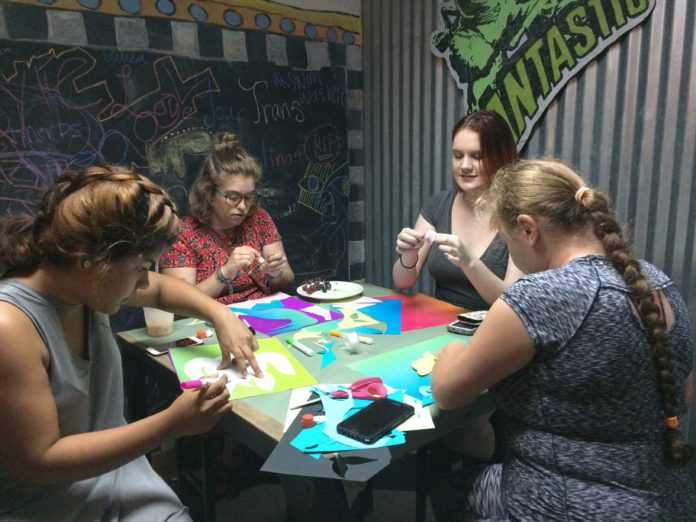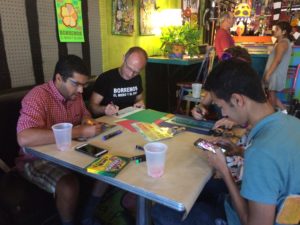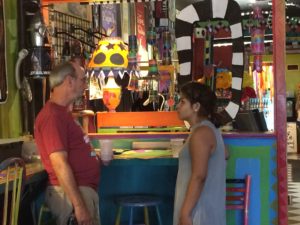
In a region of Panama called Kuna Yala, eleven Kuna communities are spread among 59 islands. The indigenous group, separate from the government of Panama, has created a cooperative society that blends modern knowledge and traditional values.
Kuna women design, sew, and wear blouses called molas to convey this blending. Hours are spent with a needle stringing together colorful layers of fabric that are trimmed to create a design, often depicting nature, traditional themes from Kuna culture, and various modern influences.
To Kuna women, molas are more than a textile art form. They show creativity, style, and individualism. However, most importantly, they express pride in identity.

Last Wednesday, Transylvania seniors organized an event called Unlearn Fear + Hate: Molas For DACA, held at Third Street Coffee and Stuff. The event branched from the Unlearn Fear + Hate project created by Transy professors Kurt Gohde and Dr. Kremena Todorova, though this event was primarily student organized.
Molas For DACA was a direct response to the events that occurred between senior Paola Garcia and Taylor Ragg, in which Ragg targeted Garcia for deportation because she is a recipient of DACA. Ragg has since left the university.
DACA, the Deferred Action for Childhood Arrivals, gave individuals who came to the United States as children a deferred period of 2 years, which protected the individuals from deportation. Recipients of DACA are able to work, study, and live in the United States, though are not granted citizenship.
Garcia was one of the seniors who organized the event in an attempt to raise awareness of DACA and show support for students enrolled in the program.
“Because of the incident with Taylor and the political climate under Trump’s administration, we did this event. We wanted to do this to show, not only in the Transy community, but in the Lexington community that there is a lot of support for immigrants. We figured this would be a great way to bridge both of them off campus, so it is less hostile,” said Garcia.
Todorova provided guidance for the students during the process of organizing Molas For DACA. For Todorova, the event is not only to foster awareness of DACA but also to discuss the stigma surrounding immigrants.
“The event is to show support for DACA and to encourage people to unlearn the fears and prejudices they might have about immigrants, about people they might see as foreign, and about DACA,” said Todorova. “Really it is an event to bring us together.”
Those who attended Molas For DACA designed molas with paper instead of cloth. The simplified version of the traditional art form allowed for discussion and awareness, according to Annelisa Hermosilla, another senior involved in the creation of Molas For DACA.
“Art brings people together, it opens a door to talk about things. It is very important to talk to people and raise awareness peacefully. Through art, you are able to do that,” said Hermosilla.
Professor Kurt Gohde also assisted students with creating Molas For DACA and described it as a small outreach event that inspired hefty discussion.
“It’s (Unlearn Fear + Hate) committed to the very firm belief that small acts matter. Those small acts add up and cover a lot more ground. This event aligns with that,” said Gohde.

Both Transy students and professors went to Molas For DACA, all with various reasons for attending.
“I just wanted to come and show my support for Paola and for all the students that are struggling to figure out if they are going to be able to stay,” said Dr. Brian Rich, professor of sociology. “This is a huge problem for our country. We have hundreds of thousands of students in this situation.”
“Paola Garcia is actually my roommate and I am supporting her as an individual as well as her entire cause,” said senior Kacy Hines.
The DACA program will be terminated in March, as announced by the Trump administration, and Congress could possibly replace it with another bill. The deadline for new applications and renewals for DACA were processed until October 5. Recipients of DACA are ridden with concern for their future.
“Personally, my DACA expires December of 2018. My concern, there, is that once I do graduate from here I will have a bachelor’s degree from a very prestigious school from a very great community, but I can’t do anything with it. I can’t pursue a career in Psychology. It’s very frustrating,” said Garcia. “The way we describe it, as DREAMers (a term that references recipients of DACA), is that we are in limbo. We are just floating around and can’t make a decision. That is the whole reason for DACA and the DREAM Act. This is our only option to have a future and to contribute to our home. The land we consider home.”
Maria Trevino Rodriguez, a DACA recipient from Houston, described to ABC News the devastation she felt after the announcement that DACA was terminated.
“I broke down when I heard what Jeff Sessions said, even though I expected him to say it,” stated Rodriguez. “It just hit me harder when I heard the words coming out of his mouth … he called me an illegal alien.“
For Garcia and other recipients of DACA, deportation is seemingly inevitable if no action is taken to replace the Dream Act.
As Garcia said, “The concern is in urgency because we have 800,000 some DREAMers who gave all their private information, very sensitive information, to the Department of Homeland Security, which is our biggest threat. If nothing is done in Congress, if there is not a bill that protects and enshrines those protections, then we are in a state of emergency.”
Garcia traveled to Washington D.C. last week to advocate for a bill that extends the same benefits of DACA to current and future DREAMers. However prominent advocacy is for DACA, or for a permanent replacement, the creation of legislation remains unknown.


